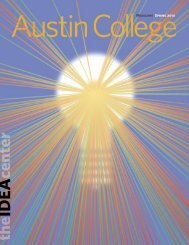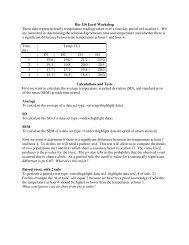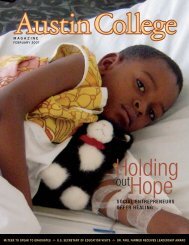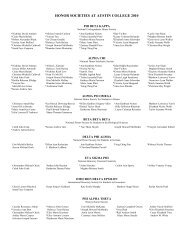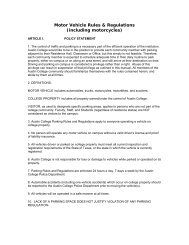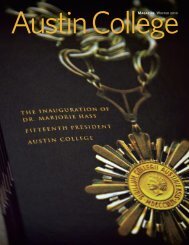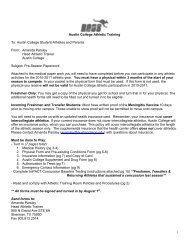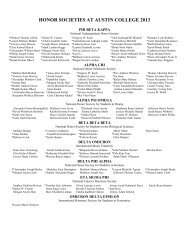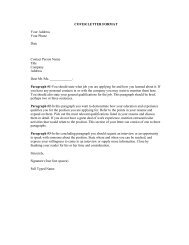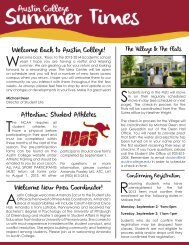Students of the Posey Leadership Institute commit to monthly community service,interact with an off-campus mentor from a corporate or community organization,and lead a special project or a cohort group as a capstone experience. Members ofthe institute are also required to observe leadership in other cultures as part of aninternational educational experience.Environmental Research Areas and Field Laboratories<strong>Austin</strong> <strong>College</strong> is fortunate to own five pieces of property in Grayson County thatserve as research areas, field laboratories, and nature preserves. The Barry BucknerBiological Preserve and Research Area is a biologically diverse 115-acre site containingnative deciduous forest, pine forest, sandstone outcrops, and successional communities.The Lee Harrison Bratz Field Laboratory, located on the sandy soil of the EastCross Timbers vegetational area, is a 76-acre site that consists primarily of deciduousforest, including both upland and bottomland vegetation. The Clinton and Edith SneedEnvironmental Research Area, a 100-acre site in the Blackland Prairie vegetationalarea, is adjacent to Hagerman National Wildlife Refuge; this property includes asmall native prairie plot and three ponds. The Sneed ERA is the site of an extensiveeffort to restore native prairie vegetation. The Garnett Prairie is a 60-acre tract, alsoin the Blackland Prairie zone; it includes a 10-acre tract of intact native prairie. TheMcCarley Woods Nature Preserve is a 12-acre site that is primarily upland hardwoodforest. These field sites serve as outdoor laboratories for students and faculty inbiology and environmental studies to examine organisms in a natural setting. Theproximity of these sites to the campus and to one another facilitates comparativestudies and long-term research projects. A number of courses including AnimalBehavior, Ecology, Evolutionary Biology, Ecosystem Ecology, Plant Biology, and VertebrateBiology use the areas for field trips, class projects, and individual research.Robert L. Snider Memorial Social Science LabThe purpose of the Social Science Lab (SSLab) is to improve and make more relevantthe education of social science students by stimulating and encouraging the use ofresearch as a teaching and learning device. It is currently located in Hopkins CenterRoom B2. It was dedicated during the sesquicentennial homecoming in honor of oneof the early student coordinators, Robert L. Snider ’72, who helped establish internshipsand resource connections with a metroplex company. The SSLab typically employsthree or four students during the academic year with some summer internships.Field and laboratory research is incorporated as a regular part of the social sciencecourses in an interdisciplinary environment for students and faculty interested inempirical research. Through the SSLab, students can observe political and socialbehavior, formulate hypotheses about human behavior, test these hypotheses bysurvey research techniques, and acquire a more immediate and realistic sense ofthe structure and needs of the community.Research Practicum in Social Science LabIn certain social science disciplines the department’s sophomore, junior, and seniorstudents may take a one-fourth course credit research practicum at the SSLab orunder an appropriate professor utilizing the SSLab resources. Such work extendsover a whole fall term, January term, spring term, or summer term and may be repeatedfor credit up to a total of one course credit unit. The research practicum isdesigned so that students may experience social science techniques by working onresearch projects while gaining an in-depth understanding of a particular area.ACADEMIC PROGRAM| 57
Interested students should consult the Social Science Lab coordinator and a facultymember who will be responsible for signing registration forms, serving as a consultantfor the student’s research, and assessing the final grade. Approval by the director ofthe Social Science Lab is required. The Social Science Lab has resources such asmodules on interviewing, survey research and data analysis techniques, and computerstatistical packages that the student may use.Off-Campus Opportunities<strong>Austin</strong> <strong>College</strong> encourages the pursuit of off-campus programs and projects by allstudents at some point in their college careers. Many of its January term offerings,summer institutes, and non-credit programs provide the means for enriched educationalexperiences. Field study opportunities are available during the regular academic yearand during the summer as well.Career Study Off-Campus (CSOC): A student may earn a maximum of three coursecredit units through Career Study Off-Campus (referred to as field study or internship)during a 14-week term and a maximum of two course credit units during the summer.During the January term, one such study course can be taken. Of the total numberof course credit units required for the Bachelor of Arts degree, not more than sixcan be Career Study Off-Campus courses. Courses are graded on an S/D/U basis.Eligibility requirements for students proposing a Career Study Off-Campus:■ Sophomore, junior, or senior standing at the time the study is undertaken■ Minimum 2.5 cumulative grade point average■ Successful completion of non-credit training workshop on self-directed learning■ Faculty instructor who will agree to evaluate the student’s CSOC■ Site supervisor must agree to oversee and ensure that the student’s goals andobjectives are met. The supervisor also must complete an evaluation for thestudent upon the completion of the CSOC.Proposed studies must be of the student’s own design and be carried out on-siteor sites that provide the student with a substantive view of the work performedin that particular profession. A student will work with an on-site coordinator orsupervisor (a qualified individual who can assist and/or partially direct the study).Proposals should reflect substantial academic, intellectual content and containclear and concise goal statements, learning objectives, and resources available,as well as some type of tangible end product to be evaluated by the instructor.All proposed studies must be approved by the most appropriate department chairand divisional dean.Further information regarding specific deadlines, procedures, and workshop dates aswell as assistance in the selection and design of various studies is available throughthe director of Career Study Off-Campus in Career Services in Adams Center.The Lilly Internship Program: Theological Exploration of Vocation. Created in January2002 by a $2 million grant from the Lilly Endowment, the Lilly Project has three goals:1. To encourage students, faculty, and alumni to reflect about the sources ofmeaning and purpose in their lives;2. To provide resources for exploring, analyzing, and challenging those purposes; and3. To help individuals take their first steps toward building lives that embody andreflect those purposes.58 | ACADEMIC PROGRAM



